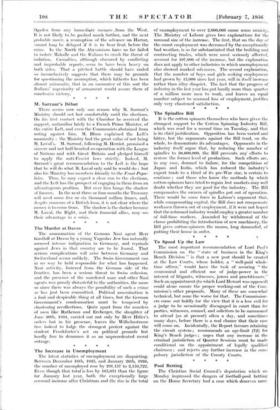The Spindles Bill It is the cotton spinners themselves who
have given the strongest support to the Cotton Spinning Industry Bill, which was read for a second time on Tuesday, and that. is its chief justification. Opposition has been varied and bitter, but the arguments against the Bill tend, on the whole, to demonstrate its advantages. Opponents in the industry itself argue that, by reducing the number of spindles to 38,000,000, the -Bill prevents anY..efforts to restore the former level of production. Such effortS are,- in any case, doomed to failure, for the competition of Japan . and . India, . which has reduced the: industry's export trade to a third of its pre-War size, is -certain to- continue ; and those who know the methods by which cotton-spinners have tried to regain lost markets may well doubt whether they are good for the industry. The Bill compensates the owners of spindles put out of operation. There would be some force in Labour's argument that, while compensating capital, the Bill does not compensate workmen thrown out of employment, if it were not hoped that the reformed industry would employ a greater number of full-time workers: Amended by withdrawal of the clause prohibiting the introduction -of new machinery, the Bill gives cotton-spinners the means, long demanded, of putting their house in order.














































 Previous page
Previous page